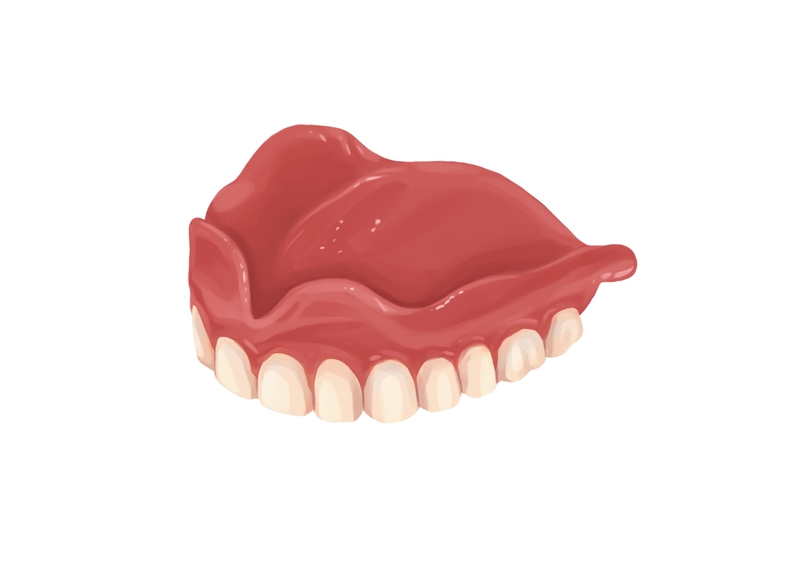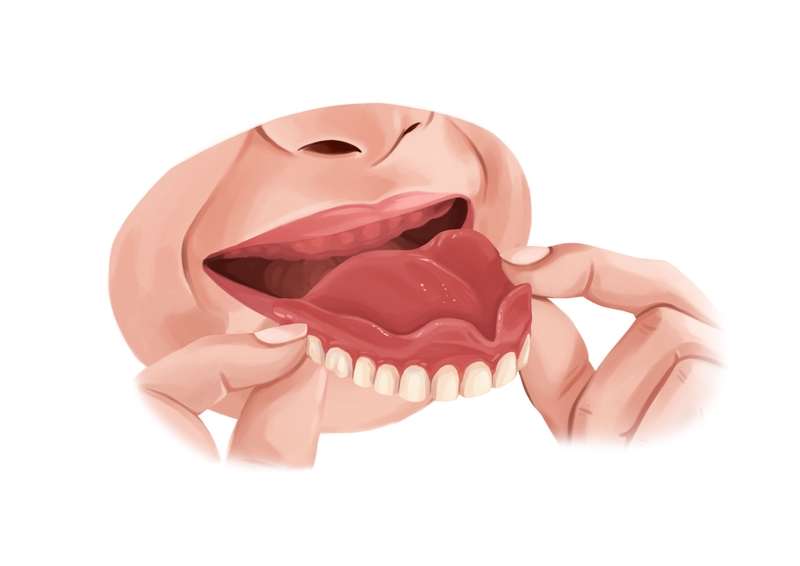- You may need some time to get used to your new dentures, as it is normal for them to feel unnatural at first. Trouble while eating and speaking and denture sores are some of the most common problems.
- It is important to take proper care of your denture and maintain its hygiene.
- An adhesive or denture relining can make your dentures more comfortable to wear.
Use Authority Dental to find a denture specialist nearby, or get a dental plan and save up to 60% on all dental procedures, including dentures.
How should dentures fit in your mouth? Here's everything you need to know.
Common upper dentures problems

Picture by Authority Dental under CC 2.0 license
There are a variety of problems you could experience with traditional dentures or even partial dentures. You may experience one of these or all of them - every person is different. Fortunately, there are solutions for each one.
Denture slippage
While it's less common with maxillary dentures than with their mandibular counterparts, the upper plate can still move, become loose, or slip out of place occasionally. It's less common for the upper arch because you should have suction between the denture and the palate (the roof of your mouth) that helps keep the appliance in place.
Trouble eating and speaking
Eating and talking do take some practice with new dentures. At first, you may find you have a speech impediment like a lisp, or you may feel like you have too much saliva in your mouth (or not enough), which makes it harder to speak properly.
Practice speaking by reading aloud to your favorite book or singing to your favorite songs. Eating with dentures is also different than it was with your natural teeth. Both take plenty of practice to get used to.
If you have a palateless denture, however, this is not a common problem. We will mention those in the next section.
Gagging
Patients with moderate gag reflexes may also have an issue wearing dentures. The denture will extend far back into the mouth, and some people feel like it gets too close to the throat. Individuals with severe gag reflexes may not be able to tolerate traditional dentures.
Denture sores
It's safe to say that every single person who gets dentures will experience at least one denture sore during the adjustment period. You should eat soft foods during this time to help reduce sore spots.
You will need to return to your dental office a few times to have the dentures adjusted so that they are not rubbing too hard in one spot, or to remove sharp spots. Denture sores will cease after several adjustments, but can occur occasionally over the course of your lifetime. Most can be solved with minor denture adjustments.
Cleaning issues
A common mistake new complete denture wearers make is thinking they don't need to pay too much attention to their oral hygiene or perform cleaning maintenance on their dentures. They're fake teeth, after all.
However, not taking good care of the dentures and your oral cavity can cause many issues, included fungal infections. Plus, not performing proper denture care will cause them to wear out faster.
How to make upper dentures fit better?

Picture by Authority Dental under CC 2.0 license
Dentures should eventually fit comfortably in your mouth and there are some things you can do to speed up the transition period.
If you have loose fitting dentures, you can try a denture adhesive to help hold them in place. There are adhesive pastes or strips you can get from your local drug store. The strips can also provide some comfort if you have a sore spot. You'll also need to have several adjustment appointments after you get a new pair of dentures. It is not uncommon to go back a few times during the first few months of getting dentures.
Over time, your denture may become more loose than it was in the beginning. This is common because the bone is constantly remodeling and reshaping itself. A denture repair service nearby can reline the denture so that it fits more snugly to your gum tissue.
Lastly, if you cannot tolerate your denture due to a gag reflex, you may be able to get a palateless denture. These dentures look more like the lower denture because they are in a u-shape.
The only caveat to this is that you may need dental implants to help keep the denture in place since the suction from the soft palate will no longer be present. Implants will keep the dentures stable.
FAQ
FAQ
How to shape dentures at home?
It is never recommended that you shape your dentures at home. You may cause even more problems and doing your own adjustments will often void any warranty on your dentures.
Is having a gap between denture and roof of mouth normal?
You should have very little to no gap between the roof of your mouth and your dentures. It's important to close this gap so that adequate suction will help keep the denture in place.
Do all upper dentures have to cover full palate?
Not all upper dentures cover the full palate. However, a palateless denture often requires dental implants to keep it in place. Implant dentures are a great option for either arch.
References
- Managing Gag Reflex during Removable Partial Denture Treatment: A Review and a Clinical Report
- The effect of diet on the bearing mucosa during adjustment to new complete dentures: a pilot study
- Traumatic Ulcerations Frequencies and Postinsertion Adjustment Appointments in Complete Denture Patients
- Facts you should know about your dentures